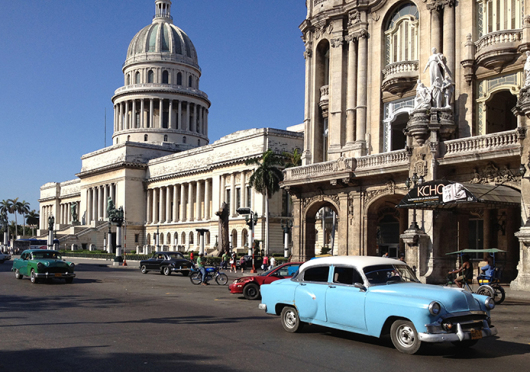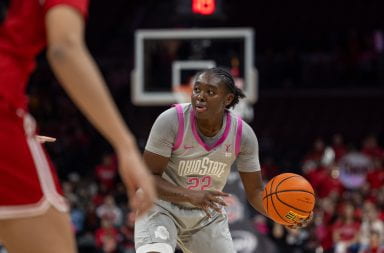For more than five decades, there have been no cultural or diplomatic relations between the United States and its southern neighbor, Cuba, despite being separated by just over 90 miles. But with President Barack Obama’s announcement of the restoration of diplomatic relations with the island nation in December, Cuba might become more accessible for many Americans, including Ohio State students.
“The United States of America is changing its relationship with the people of Cuba,” Obama said in his Dec. 17 statement. “In the most significant changes in our policy in more than 50 years, we will end an outdated approach that for decades has failed to advance our interests, and instead, we will begin to normalize relations between our two countries.”
The regulations barring interactions between the U.S. and Cuba were officially issued by the Department of the Treasury on July 8, 1963. Although they have been amended over time to include more freedoms for travel and people-to-people contact — especially for individuals in America with family in Cuba — the island was mostly isolated from the United States following the Cold War.
In his speech, Obama said in addition to establishing an embassy in Havana and sponsoring diplomatic meetings between officials from the two nations, the changes will involve taking steps to “increase travel, commerce and the flow of information to and from Cuba.”
Although taking a direct flight to Cuba for a spring break trip is still far from being a reality, the decision to restore full relations with the country has the potential to impact students’ abilities to travel for educational or research purposes, said Dru Simmons, international risk manager at the OSU Office of Financial Services.
“The possibilities are definitely looking wider,” he said.
Previously, OSU did not have a formal position for or against travel to Cuba, Simmons said. Instead, the school would operate based on guidelines on travel set by the Department of Treasury.
Under these guidelines, Simmons said, students who were interested in traveling abroad to Cuba were required to go through a series of steps, including submitting a proposal for a license to travel.
“In 2011 … there was an opening of what was called a ‘general license’ and under the general license, there were certain categories that universities could allow for study or research in Cuba that did not require a special licensing,” he said. “You didn’t have to appeal for a special license, so long as you met the categories in the guidelines, you could travel under a general license.”
But the specific research category under the general license was only available to graduate-level students, Simmons said. Undergraduates could participate in some of the other categories under the previous general licenses, but research was not one of them.
“An undergraduate could not propose to go pursue just an individual research project unless they actually went and got a special license,” he said.
Now, with the new easing of regulations, Simmons said undergraduates fall under the general license and can pursue research or attend academic conferences in Cuba.
“I think there will be definitely more opportunities,” he said. ““A prime example of that is the research allowance now allows for undergraduates, not just graduates, (to travel to Cuba).”
Simmons said OSU has not hosted a student study abroad program to Cuba since the early 2000s, when the Department of Theatre would take students down to study. After more restrictions were placed on international travel, this program was no longer offered. In recent years, any travel to Cuba from OSU has consisted of individual research, he added.
However, some universities have offered student group travel programs to Cuba despite the inconveniences of regulations.
Christine McIntyre, a Spanish professor and director of the international studies program at Wittenberg University in Springfield, Ohio, said she has taken student groups to Cuba for a language and culture study for the past four years.
“I take students on a summer study for about a month,” she said. “It is an academic experience, so it has academic credit involved.”
McIntyre said the process of taking the students to Cuba, even for this short period of time, requires months of planning.
“In January, when the group has coalesced, it also requires sending visa applications … All of that information has to go to Cuba so that they can be issued a student visa for while they are in Cuba,” she said. “Wittenberg University also has a committee that oversees approval of study abroad programs to make sure that student safety and issues like that are taken account of. That process starts in March and the trip happens in June.”
Marilyn Rodriguez, a second-year in biochemistry at OSU whose father was born and raised in Cuba, said she was “really shocked” at the news of Obama’s decision.
“I was not expecting that to happen anytime soon. I was thinking, ‘Yeah, maybe way in the future, 10 years from now.’ I want to practice my Spanish and meet my family and everything,” she said. “I would definitely be interested in going to Cuba.”
Rodriguez said she has not traveled to Cuba before and her father has not been back since he left the country. She added that while she appreciates having the option to visit Cuba, she is not sure if it is a study abroad destination for everyone.
“As far as studying abroad, I am not sure how safe Cuba is right now, especially for Americans who do not speak Spanish,” she said.
Matt Thompson, a fifth-year in biology, said he would be interested in potentially going to Cuba as a missionary for his church.
“Our church has actually sent people to Cuba as missionaries, and hopefully with the new relations that we have with Cuba and the travel restrictions lifted a little bit, we might be able to get there more often or (send) more missionaries there to spread the word,” he said, adding that both his grandmother and sister have traveled to Cuba as missionaries.
Thompson said although he would have some hesitations going to Cuba, he thinks the easing of regulations is a step in the right direction.
“I would have reservations simply because of the past with the U.S., but I think if the restrictions have been lifted, I think it is definitely for the better and it kind of points in the right direction that we are having good relations with other countries around the world,” he said. “I think it is good to be able to study abroad simply because it gives us a taste of other cultures and how other countries do things.”
McIntyre said she thinks the decision to restore relations with Cuba will not only simplify the process for U.S. students studying abroad, but it will also make it easier for Cuban students to come to the U.S., something McIntyre said has been almost impossible in the past.
“I think it is important on a people-to-people level for students from the U.S. to understand the Cuban people … and for people to understand each other and learn that we really are not each other’s enemies.”
Correction: March 1, 2015
An earlier version of this article seemed to imply that under previous regulations, the general license only applied to graduate students. In fact, the general license included several categories. Both graduates and undergraduates were able to apply to some of these categories. Research was a category that only applied to graduate students.



